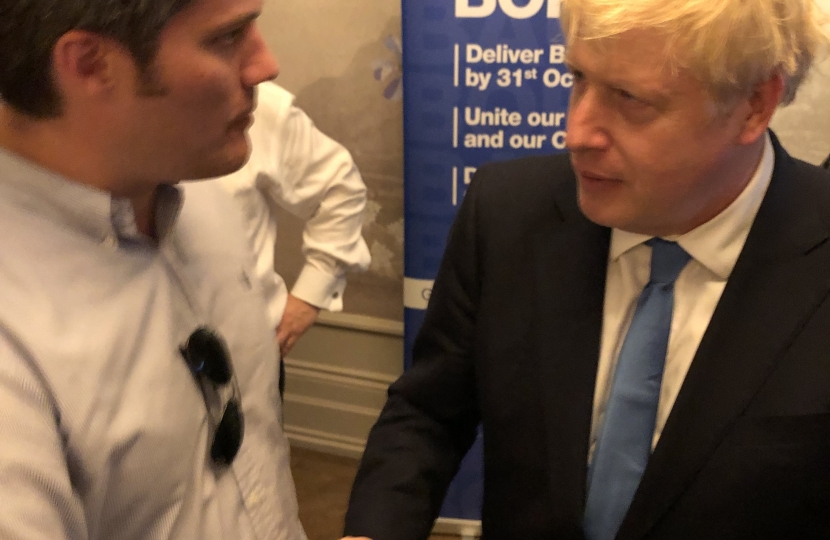
Made by: Boris Johnson MP Prime Minister on February 3rd, 2020
This statement sets out the Government’s proposed approach to the negotiations with the EU about our future relationship. Further details on this and other trade negotiations will be made available to Parliament as the process develops.
The Government wishes to see a future relationship based on friendly cooperation between sovereign equals for the benefit of all our peoples. There is complete certainty that at the end of 2020 the process of transition to that relationship will be complete and that the UK will have recovered in full its economic and political independence. The Government remains committed in all circumstances to securing all those benefits for the whole of the UK and to strengthening our Union.
The question for the rest of 2020 is whether the UK and the EU can agree a deeper trading relationship on the lines of the free trade agreement the EU has with Canada, or whether the relationship will be based simply on the Withdrawal Agreement deal agreed in October 2019, including the Protocol on Ireland / Northern Ireland. In either event the UK will be leaving the single market and the customs union at the end of this year and stakeholders should prepare for that reality.
The Government will work hard to achieve a balanced agreement that is in the interests of both sides, reflecting the wide range of shared interests. Any agreement must respect the sovereignty of both parties and the autonomy of our legal orders. It cannot therefore include any regulatory alignment, any jurisdiction for the CJEU over the UK’s laws, or any supranational control in any area, including the UK’s borders and immigration policy.
This points to a suite of agreements of which the main elements would be a comprehensive free trade agreement covering substantially all trade, an agreement on fisheries, and an agreement to cooperate in the area of internal security, together with a number of more technical agreements covering areas such as aviation or civil nuclear cooperation. These should all have governance and dispute settlement arrangements appropriate to a relationship of sovereign equals.
Future cooperation in other areas does not need to be managed through an international Treaty, still less through shared institutions. The UK will in future develop separate and independent policies in areas such as (but not limited to) the points-based immigration system, competition and subsidy policy, the environment, social policy, procurement, and data protection, maintaining high standards as we do so. Cooperation on foreign affairs and related issues is of course likely to be substantial, but does not in itself require a joint institutional framework.
In its negotiations with the EU, the Government will be acting on behalf of the UK Crown Dependencies and Overseas Territories: the whole UK family.
The UK proposes to agree similar arrangements with the EFTA states.
Further information is set out below. Unless otherwise stated, it should be assumed that the UK’s aspiration and level of ambition is to reach agreement on provisions which are at least as good as those in the EU’s recent trade agreements, such as those with Canada or Japan.
- Free Trade Agreement
A free trade agreement between the UK and EU should reflect, and develop where necessary, existing international best practice as set out, inter alia, in FTAs already agreed by the EU.
It should cover the following areas:
National Treatment and Market Access for Goods
There should be no tariffs, fees, charges or quantitative restrictions between the UK and the EU. There should be a protocol setting out appropriate and modern rules of origin, in order to facilitate trade between the parties to the greatest extent possible.
Trade Remedies
The agreement should enable the UK to protect its industry from harm caused by unexpected surges in imports of goods or by unfair trading practices, while making the appropriate commitments to transparency, due process and proportionate use of trade remedies.
Technical Barriers to Trade
There should be provisions to address regulatory barriers to trade in goods, providing for cooperation on technical regulation, standards, conformity assessment procedures and market surveillance, building on the WTO Technical Barriers to Trade Agreement. Annexes to the agreement could include provisions facilitating trade in specific sectors, such as organic products, motor vehicles, chemicals and pharmaceuticals, as well as mutual recognition agreements focusing on conformity assessment, with full coverage of the relevant sectors.
Sanitary and Phytosanitary Measures
The UK will maintain its own autonomous sanitary and phytosanitary (SPS) regime to protect human, animal and plant life and health and the environment, reflecting its existing high standards. In certain areas it may be possible to agree equivalence provisions to reduce practical barriers to trade at the border.
Customs and Trade Facilitation
Facilitative customs arrangements, covering all trade in goods, should be put in place in order to smooth trade between the UK and the EU. These should ensure that both customs authorities are able to protect their regulatory, security and financial interests.
Cross-Border Trade in Services and Investment
Significant provisions on trade in services are an essential component of a comprehensive FTA. Accordingly, the Agreement should include measures to minimise barriers to the cross-border supply of services and investment, on the basis of each side’s commitments in existing FTAs. In areas of key interest, such as professional and business services, there may be scope to go beyond these commitments.
There should be measures to support digital trade, building on the most recent precedents.
Temporary Entry for Business Purposes (Mode 4)
As is normal in a Free Trade Agreement, the agreement should include significant reciprocal commitments on the temporary entry and stay of individuals, so that both EU and UK nationals can undertake short-term business trips to supply services. This is of course without prejudice to the future points-based immigration system.
Regulatory Framework
There should be measures that reduce unnecessary barriers to trade in services, streamlining practical processes and providing for appropriate regulatory cooperation.
Mutual Recognition of Professional Qualifications
The Agreement should provide a pathway for the mutual recognition of UK and EU qualifications, underpinned by regulatory cooperation, so that qualification requirements do not become an unnecessary barrier to trade.
Financial Services
The Agreement should require both sides to provide a predictable, transparent, and business-friendly environment for financial services firms, ensuring financial stability and providing certainty for both business and regulatory authorities, and with obligations on market access and fair competition. Given the depth of the relationship in this area, there should also be enhanced provision for regulatory and supervisory cooperation arrangements with the EU, and for the structured withdrawal of equivalence findings.
Road Transport
There should be reciprocal commitments to allow EU and UK road transport operators to provide services to, from and through each other's territories, with associated rights, underpinned by relevant international agreements and commitments, and ensuring the necessary cooperation on monitoring and enforcement.
Competition Policy, Subsidies, Environment and Climate, Labour, Tax
The Government will not agree to measures in these areas which go beyond those typically included in a comprehensive free trade agreement. The Government believes therefore that both Parties should recognise their respective commitments to maintaining high standards in these areas; confirm that they will uphold their international obligations; and agree to avoid using measures in these areas to distort trade.
- Agreement on Fisheries
The UK will become an independent coastal state at the end of 2020 and any agreement must reflect this reality. The UK will, like Norway, Iceland and the Faroe Islands, have annual negotiations with the EU on access to waters and fishing opportunities, and will consider a mechanism for cooperation on fisheries matters.
- Agreement on Internal Security Cooperation
Protection of citizens is the highest duty of any Government. The UK believes it is in the UK’s and EU’s mutual interest to reach a pragmatic agreement to provide a framework for law enforcement and judicial cooperation in criminal matters between the UK and the EU, delivering strong operational capabilities that help protect the public. The detail of such an agreement must be consistent with the Government’s position that the CJEU and the EU legal order must not constrain the autonomy of the UK's legal system in any way.
- Other Areas of Cooperation
The Government believes there is mutual benefit in an air transport agreement covering market access for air services, aviation safety and security, and collaboration on air traffic management.
The UK is ready to work to establish practical provisions to facilitate smooth border crossing arrangements, as part of independent border and immigration systems, and on social security coordination. All such arrangements should be reciprocal and of mutual benefit. The UK is ready to discuss cooperation on asylum, including family reunion, and illegal migration.
The UK is ready to consider participation in certain EU programmes, once the EU has agreed the baseline in its 2021-2027 Multiannual Financial Framework, and taking into account the overall value to the UK of doing so.
Finally, there are certain areas where the UK considers agreement is self-evidently in the interest of both sides, and where early progress is a test of the constructive nature of the negotiating process. For example, there should be rapid agreement that the UK and the EU would list each other for trade in live animals, animal products, seeds and other plant-propagating material. There should be rapid progress towards a Civil Nuclear Agreement, given the implications for both sides of not doing so and the clear benefits of cooperation. Similarly, the UK would see the EU’s assessment processes on financial services equivalence and data adequacy as technical and confirmatory of the reality that the UK will be operating exactly the same regulatory frameworks as the EU at the point of exit. The UK intends to approach its own technical assessment processes in this spirit

